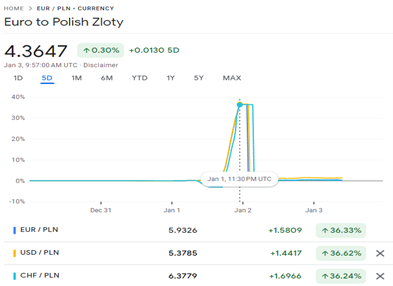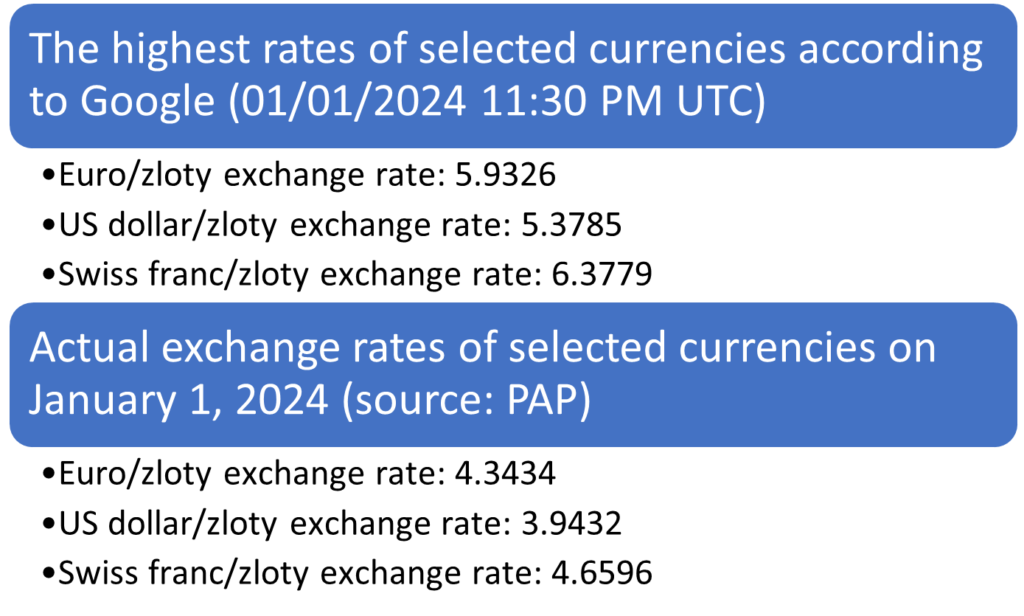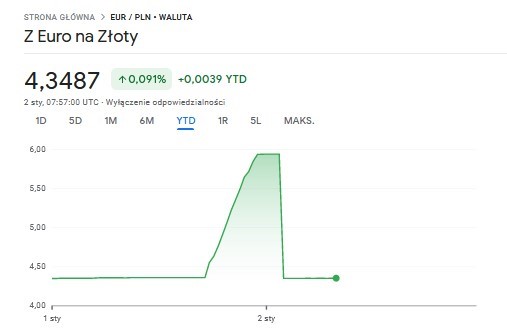Confusion caused by a Google algorithm error in the PLN exchange rate – analysis of a recent case
Publication date: February 26, 2024

On January 1, 2024, there was a sensation in the Polish zloty exchange rate on the currency market in Poland. The popular Google search engine presented data that indicated a significant increase in the value of foreign currencies in relation to the Polish zloty.
Google algorithm error.
The New Year could start very financially for holders of foreign currencies thanks to the current currency rates published by the Google search engine. On Monday, January 1, from 5:30 p.m., Internet users observed a sudden jump in the value of currencies compared to the Polish zloty via the Google search engine. At its highest point, the value of the zloty decreased by over 30%.
However, such a sudden and unexpected change could only be observed on the Google platform. All other websites providing the same data indicated that the exchange rate of selected foreign currencies was stable and maintained at a constant level.

This error was probably the result of an error in the algorithm responsible for providing data from external entities. Unfortunately, due to the delay in Google’s response and the desire to make easy money, many people decided to take advantage of the opportunity. However, portals dealing in securities trading on a daily basis turned out to be more cautious and accurate in their calculations. The ByBit platform turned out to be an exception, through which it was possible to sell previously purchased currency (currency purchased at the correct exchange rate via platforms such as Revolut) for a much higher rate, probably resulting from the data presented by Google Finance. Investors therefore used false quotations for arbitrage, buying euros or dollars at the real exchange rate and selling at the inflated one. Of course, in most cases, the ByBit platform canceled these transactions or took away the differences resulting from price fluctuations from investors who decided to make such transactions. The consequence of these actions was a significant loss of image among its customers.
Position of the Ministry of Finance, the Ministry of Digitization and the National Bank of Poland.
The Ministry of Finance asked Google Polska via the X platform to provide information on the reasons for the false publication on January 1 regarding the zloty exchange rate and on the actions it intends to take to avoid similar situations in the future.
The Ministry of Digitization acted similarly, asking, via the X platform, for information on the reasons for the false publication regarding the zloty exchange rate. However, contrary to the statement of the Ministry of Finance, the official Google Poland account decided to respond to the Ministry’s request and exchanged information previously provided to the Ministry of Finance.
The NBP, through its spokesman, also commented on the New Year’s turmoil related to the fictitious exchange rate on the X platform. He informed that verified and fully reliable rates are published by the NBP on its website and cited information from Google’s response to the statement of the above-mentioned Ministry of Digitization.
Google’s reaction.
The official reaction of Google Polska to the provision of fictitious Polish zloty exchange rates is the previously mentioned response on the X portal to the statement of the Ministry of Digitization. According to it: “[…] search functions, such as displaying currency exchange rates, are based on data from external sources. Google does not verify data from suppliers, does not interfere with their content and cannot guarantee the currency rates presented are current. Data is displayed as delivered. If errors are reported, we contact the data provider to correct them as soon as possible.”
Moreover, Google Polska officially apologized for the situation and decided to temporarily disable the function of displaying exchange rates. Additionally, they attached a link to the regulations to their statement so that interested people could read them.
Is Google liable for the error?
In its position, Google mentioned sources of information provided to them by external entities. For currency prices, it is the American company Morningstar.
Consequently, the presentation of courses in an online search engine should only constitute information. They cannot be used as investment advice or constitute the basis for any investment plans of individual entities. Thus, with each visual representation of the exchange rate of a specific currency, there is information about Google’s disclaimer (“Disclaimer” or ” Disclaimer “). You can see this in the screenshot below.

After clicking on “Disclaimer”, we will be taken to the previously mentioned regulations, which constitute key considerations for the possibility of attributing liability to Google for damages potentially resulting from the error of the algorithm they use. It states that: “All data and information are presented ‘as is’ for your information and personal use only. It is not intended to be used for investment purposes or constitute financial, investment, tax, legal or accounting advice. Please consult your broker or financial advisor before making a transaction. Google is not a company providing investment or financial advisory services and does not mediate in purchase and sale transactions of securities. No data or information constitutes investment advice, an offer, recommendation or solicitation by Google to buy, sell or hold any security or other financial product. Google also does not guarantee the merits or appropriateness of any investment.” In addition, the regulations in question also include a subsection that relates strictly to the issue of currency conversion and reads as follows: “Google cannot guarantee the accuracy of the presented exchange rates. Please check current rates before making any transactions that depend on currency exchange rates.”
To sum up, both the Google Polska statement and their regulations indicate that the inflated rates are an error on the part of the data provider. The lack of verification by Google may cause outrage among recipients, but the warning about the disclaimer, as well as the regulations to which it refers, undoubtedly inform about this fact. As a result, any transactions made by entities in the period from January 1 to January 2 this year, and more precisely, damages resulting from potential losses, cannot be attributed to Google, as it is only a supplier of information from external entities. Moreover, the regulations warn against using this data without verification and recommend obtaining detailed data from specialists or other entities providing specific information, such as the exchange rates discussed above. All these issues were available for review when presenting the rates of specific currencies. There were also no obstacles preventing people using the Google search engine from reading the content of the regulations. Therefore, any unsuccessful investment made after obtaining knowledge available via the Google search engine cannot be attributed to errors in collecting information.
